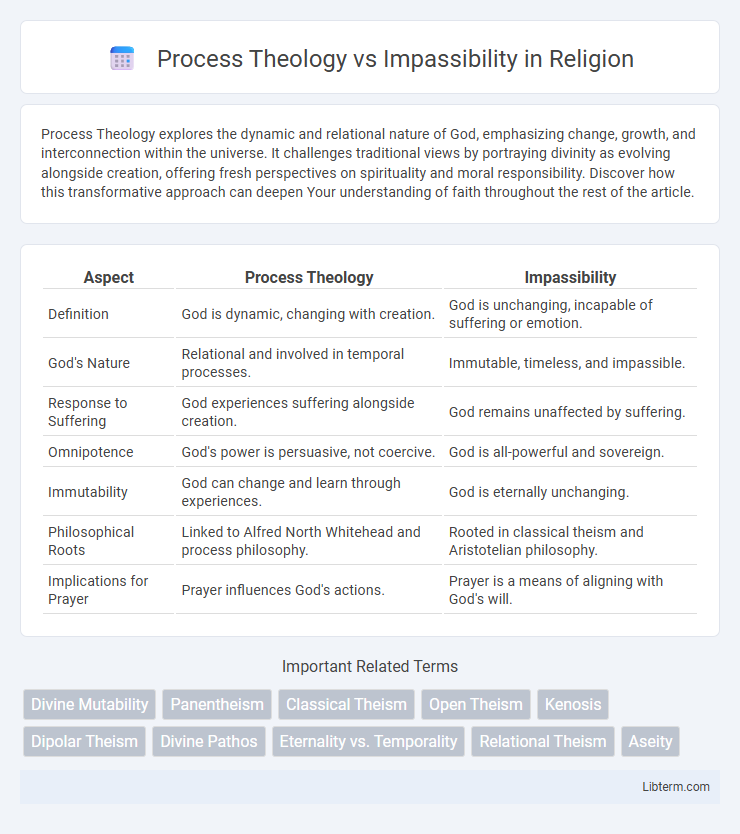Process Theology explores the dynamic and relational nature of God, emphasizing change, growth, and interconnection within the universe. It challenges traditional views by portraying divinity as evolving alongside creation, offering fresh perspectives on spirituality and moral responsibility. Discover how this transformative approach can deepen Your understanding of faith throughout the rest of the article.
Table of Comparison
| Aspect | Process Theology | Impassibility |
|---|---|---|
| Definition | God is dynamic, changing with creation. | God is unchanging, incapable of suffering or emotion. |
| God's Nature | Relational and involved in temporal processes. | Immutable, timeless, and impassible. |
| Response to Suffering | God experiences suffering alongside creation. | God remains unaffected by suffering. |
| Omnipotence | God's power is persuasive, not coercive. | God is all-powerful and sovereign. |
| Immutability | God can change and learn through experiences. | God is eternally unchanging. |
| Philosophical Roots | Linked to Alfred North Whitehead and process philosophy. | Rooted in classical theism and Aristotelian philosophy. |
| Implications for Prayer | Prayer influences God's actions. | Prayer is a means of aligning with God's will. |
Introduction to Process Theology and Divine Impassibility
Process Theology presents God as dynamic and relational, experiencing change and interacting with the world, contrasting sharply with the traditional doctrine of Divine Impassibility, which asserts God's immutability and inability to suffer or be affected. Rooted in the philosophy of Alfred North Whitehead, Process Theology emphasizes God's ongoing creative experience and responsiveness to creation's events. Divine Impassibility upholds God's transcendence and perfection by affirming that God does not undergo emotional changes or suffer, preserving God's eternal constancy and immutability.
Historical Development of Divine Impassibility
The historical development of divine impassibility traces back to early Christian theologians like Augustine and Aquinas, who emphasized God's immutability and incapacity to suffer or change, aligning divinity with perfection and transcendence. This doctrine was challenged in the 20th century by Process Theology, influenced by Alfred North Whitehead, which argues that God is dynamic and relational, capable of experiencing temporal processes and emotions. The debate centers on whether divine nature includes passibility, reflecting evolving theological, philosophical, and scriptural interpretations throughout Christian history.
Core Principles of Process Theology
Process Theology centers on the belief that God is dynamic and relational, continuously interacting with the world and experiencing change alongside creation. Unlike traditional impassibility, which asserts that God is immutable and unaffected by temporal events, Process Theology emphasizes God's responsiveness and evolving nature. Key principles include panentheism, relationality, and the rejection of divine immutability, highlighting a deity deeply involved in the unfolding processes of the universe.
Philosophical Foundations: Being and Becoming
Process Theology emphasizes the concept of God as dynamic and evolving, rooted in the philosophy of becoming where reality is characterized by change and relationality. In contrast, the doctrine of Divine Impassibility asserts that God is immutable and unaffected by temporal processes, grounded in a metaphysical framework of being as static and unchanging. These differing philosophical foundations highlight a fundamental tension between understanding God as an evolving presence versus a transcendent, unalterable entity.
The Nature of God: Change vs. Unchangeability
Process Theology asserts that God is dynamic and relational, undergoing change in response to temporal events and interactions with the world. In contrast, the doctrine of divine impassibility holds that God is immutable, unaffected by external influences, and remains eternally unchanging in nature and emotions. This fundamental divergence centers on whether God's essence accommodates change (Process Theology) or embodies absolute unchangeability (Impassibility).
The Problem of Suffering and Divine Responsiveness
Process Theology addresses the Problem of Suffering by rejecting divine impassibility, positing that God experiences and responds dynamically to the world's pain, thereby offering empathetic presence rather than distant omnipotence. Unlike classical theism, which holds God as unchanging and unaffected by creation, Process Theology envisions a God who co-suffers and cooperates with creation's ongoing process. This responsive divine nature allows for a more relational understanding of God's engagement with human suffering and the unfolding of reality.
Biblical Perspectives on Divine Emotion and Impassibility
Biblical perspectives on divine emotion reveal a God who actively experiences compassion, anger, and love, challenging the classical notion of divine impassibility that denies God's capacity for suffering or emotional change. Process Theology emphasizes God's dynamic relationality and responsiveness to creation, aligning with numerous scriptural passages in which God interacts emotionally and adapts to human actions (e.g., Exodus 32:14, Jonah 3:10). Impassibility, rooted in classical theism, interprets divine immutability and perfection as precluding emotional fluctuations, yet this stance often conflicts with the vivid portrayals of God's emotional engagement in both the Old and New Testaments.
Critiques and Defenses of Impassibility
Critiques of divine impassibility emphasize that an emotionless God lacks genuine relationality and responsiveness to human suffering, undermining the concept of a compassionate deity. Process theology argues for a God who experiences change and interacts dynamically with creation, asserting that impassibility makes God distant and unrelatable. Defenses of impassibility maintain that God's immutability preserves divine perfection and sovereignty, preventing God's nature from being influenced or diminished by temporal events.
Practical Implications for Faith and Worship
Process Theology emphasizes a dynamic, relational God who experiences change and suffering, encouraging believers to engage in a responsive and evolving faith that acknowledges human and divine interdependence. This perspective fosters worship practices centered on dialogue, empathy, and active participation in God's ongoing creative process. In contrast, the doctrine of Divine Impassibility promotes an immutable, unaffected God, guiding faith communities toward reverence, trust in divine sovereignty, and worship focused on God's transcendent perfection and unchanging nature.
Future Directions in the Process Theology vs. Impassibility Debate
Future directions in the process theology versus impassibility debate emphasize integrating relational theism with contemporary philosophical insights on divine omnipotence and timelessness. Scholars increasingly explore dynamic divine attributes, proposing models where God's empathy and mutable experiences coexist with essential transcendence. Emerging interdisciplinary research aims to reconcile scriptural interpretations with metaphysical frameworks, advancing an enriched understanding of divine nature in theological discourse.
Process Theology Infographic

 libterm.com
libterm.com